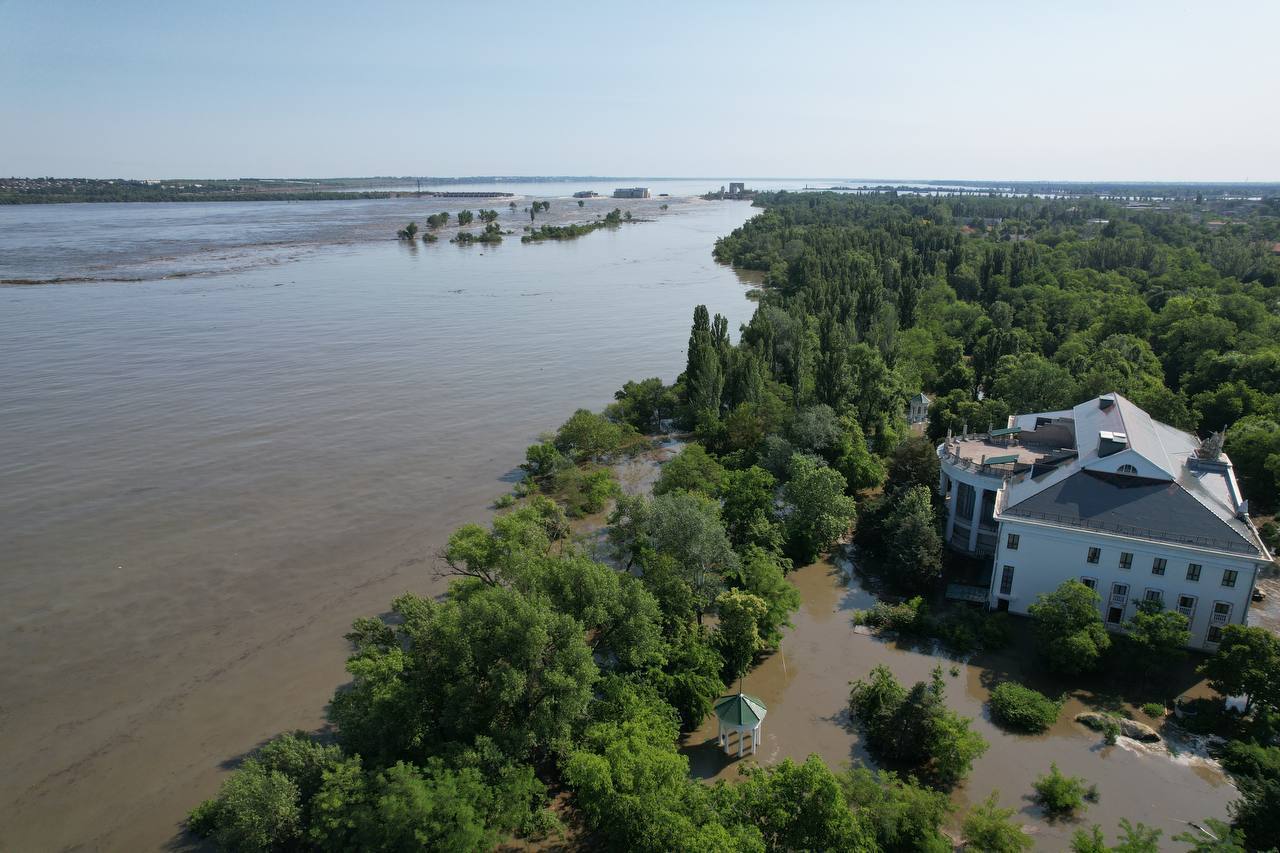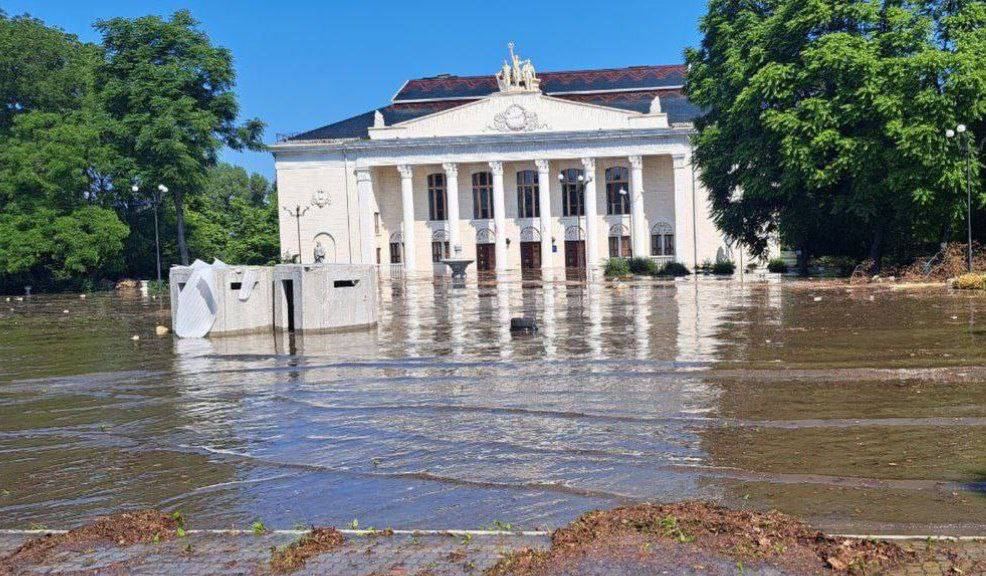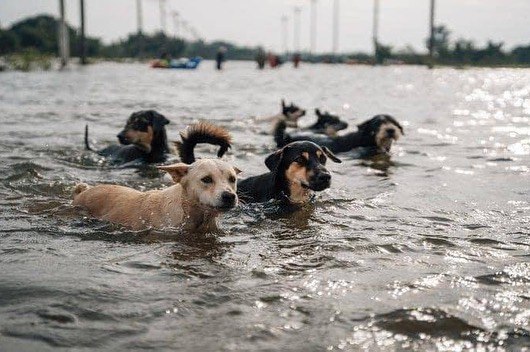by Кошуба Анастасія
Оберіть вашу мову:6 Червня 2023, 13:17
The occupiers blew up the Kakhovskaya HPP. What is the threat and what will happen next?
In advance, the destruction of the dam leads to the terrible ecological and economic consequences. The war crime itself is equivalent to detonating an atomic bomb or a nuclear power plant. “A global disaster, ecocide, the destruction of the Kakhovskaya HPP took place in Ukraine, which will lead to irreparable consequences. The environment has no […]
In advance, the destruction of the dam leads to the terrible ecological and economic consequences. The war crime itself is equivalent to detonating an atomic bomb or a nuclear power plant.
“A global disaster, ecocide, the destruction of the Kakhovskaya HPP took place in Ukraine, which will lead to irreparable consequences. The environment has no borders, so the consequences of military actions in Ukraine will be felt by the whole world. A one-time decrease in water in a huge reservoir will lead to unpredictable environmental consequences: the evacuation of citizens , the death of a large number of fish, the waterlogging of drained lands and a change in the climate regime of the region. We call on every inhabitant of the planet to join in overcoming the consequences of ecocide.” – said Iuliia Markhel, the leader of Ukraine’s largest environmental movement Let’s do it Ukraine.

What is the threat of a night explosion?
Simulation of the worst-case scenario of the destruction of the dam (if all 200-meter-wide locks are blown up) the greatest flooding will occur on the left (southeastern) bank of the river. It is known that 11 of the 28 spans of the dam have been destroyed. That is, the approximate width of the breakthrough is 177 meters.
A wave with a height of 4-5 m will hit the Antonivsky bridge east of Kherson after 7 p.m. After that, the water will rise up the Ingulets River, and after 4-5 days – the water will rise up the Bug River to Mykolaiv.
Several smaller towns and villages on both sides of the Dnieper will be flooded, and when the wave reaches them, it can be very dangerous and cause human casualties. There are more than 80 settlements in the zone of rapid flooding, including Kherson. You can already see videos from nearby villages, where only the roofs of buildings are visible.
According to Ukrhydroenerny, the reservoir will be activated in 4 days – that is, all the accumulated water will flow out and only the natural channel of the Dnipro will remain.

Geneva Convention
Destroing of the Nova Kakhovka dam is a war crime under the Geneva Convention, but russia is already systematically violating the Geneva Convention during its illegal war in Ukraine.
The destruction of hydroelectric power plants is considered a weapon of mass destruction and a war crime of indiscriminate action, according to Article 56 of Additional Protocol I of 1977.
The Prosecutor General’s Office noted that an investigation under the article of ecocide has already been launched into the fact that the occupiers blew up the Kakhovskaya HPP.
“Ecocide continues in Ukraine, and with today’s disaster – the destruction of the Kakhovskaya HPP – the Russian army is once again destroying and terrorizing our environment and the environment of the entire planet, thus threatening the entire civilized world” – added Iuliia Markhel, leader of Ukraine’s largest environmental movement Let’s do it Ukraine
What happens next?
Zaporizhzhia NPP
The supply of cooling water to Europe’s largest nuclear power plant, ZANP, which requires cooling even for shut-down reactors, is likely to stop.
North Crimean Canal
Water supply to Crimea will stop.
Reclamation of Tavria and the Kakhovsky Canal
The supply of water to the field irrigation systems of the Kherson, Dnipropetrovsk, and Zaporizhia regions will be stopped, and mainly on the occupied lands. Many cities and villages that consume it from the Kakhovsky Canal will remain without drinking water, in particular occupied Berdyansk.
Factories
Without a sufficient amount of water, the work of large industrial enterprises of the metallurgical industry in Marhanka, Nikopol, and Pokrov will have to be stopped.
Ecology is the worst!

The Kakhovskaya HPP reservoir was an important ecological environment and a source of fresh water for many species of plants and animals. A huge sandy bottom will open and we will get a new desert with all the climatic consequences: a decrease in precipitation, dust storms, a rise in temperature in the region. And accordingly, there is a greater risk of drought in the fields of central and southern Ukraine.
Sweeping everything in its path, the water is also contaminated with chemicals from industrial plants, mixed with sewage, etc. Epidemiological risks and risks of water pollution are multiplying.
Under the condition of complete liberation of the Kherson region, it may take from 1 to 3 years to restore the dam. According to Ukrhydroenergo, the station is not in need of restoration. Most likely, it means that it will be necessary to build a dam from the foundation.
It takes a lot of time not only for the concreting of the main structure, but also for the reconstruction of the coastal fortifications and the subsequent controlled filling of the reservoir bowl. This is all a long process.
All the while, we will reap the environmental and technological consequences of this crime. The nature and economy of Ukraine have adapted to the existence of hydroelectric power plants for almost 70 years of operation of the station and the existence of a large reservoir.
The lack of water in the Kakhovsky Sea will lead to the drying of the fields of southern Ukraine with further desertification. The Zaporizhzhia NPP and dozens of large plants will have to be closed, which will not have enough water and electricity for production processes.
Accordingly, the population will leave this region en masse due to the impossibility of living in difficult climatic conditions, due to the lack of water and jobs.
Therefore, all hope is on the Defense Forces and Western partners, who will help to free Noh as soon as possiblein Kakhovka and begin the restoration of the hydroelectric power plant and the Kakhovka Sea.
Together to victory!
Conact: +380 (66) 444 51 43 – Anastasiia

